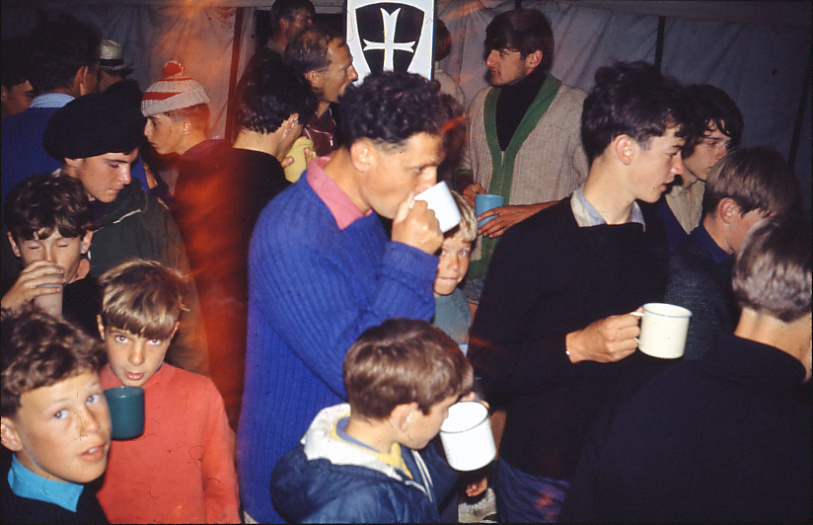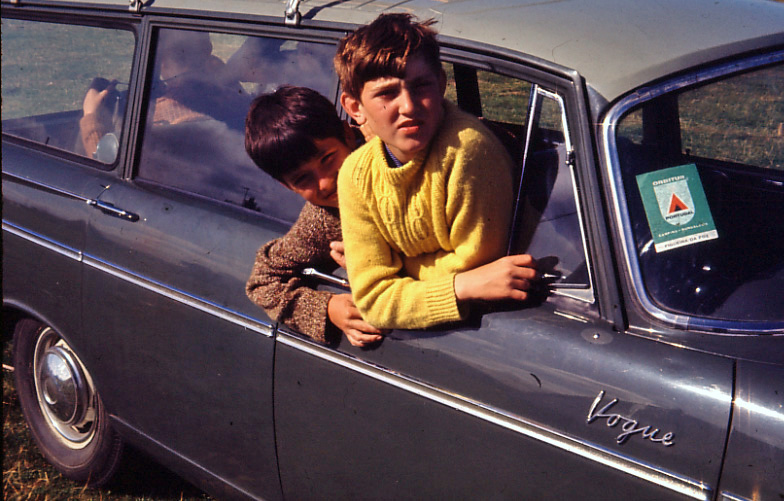Here’s an interesting and rather blunt quote, actually from a Hindu vocational adviser on Linkedin:
The passion, in “following your passion”, is largely driven by interest. This interest is mostly floating and is largely influenced by the environment and current trends… Following your passion can be very misleading, many times it leads you to nowhere and a permanent state of unhappiness. Desire is born out of a passionate mind, the more you feed it, the stronger it grows, and when the desire is unfulfilled it agitates the mind.
This seems to echo the biblical pessimism about “passions” I explored here. The source above, incidentally, goes on to advise young people on how they can find a personalised career that will satisfy them even in mundane tasks.
I became a Christian at the tender age of thirteen, at a Christian camp tent meeting on the evening of, as far as I can now figure it, Wednesday 1st September, 1965. Because I wasn’t called upon to give a testimony until many years later, such details had already largely faded in my memory. What I did remember was that, to my shame, I didn’t follow the advice of the speaker who gave the gospel address, Bruce Blackie, to tell someone that I had made a commitment.
Consequently I spent the first few of my years as a believer wondering if I really was a Christian at all. If I had acknowledged my new faith to someone else, they could have prayed for me and been a source of advice and reassurance. Still, here I am nearly sixty years later, and happy to give anyone, including you, “an account of the hope that is in me,” so grace overcame funk in the end.

Thinking back just recently, I remembered for the first time that, whilst my reticence in admitting my conversion was, indeed, largely from reprehensible cowardice (though my unsympathetic family twigged very quickly anyway, and my new interest in Bible studies, prayer meetings and so on also gave the game away), there was another, somewhat less discreditable reason.
This was my fourth camp, and I was slowly overcoming my initial offence at the gospel which called out my sin, and the Cross and lifelong obedience to Christ which is the only solution. I believe I already had in mind that if I didn’t take the final step at this last Wednesday service, I might throw away something crucial for good. But at the same time I was aware of a number of the other kids who, in previous years, had loudly proclaimed they were now Christians, yet had either not changed at all, or had given up their faith within weeks of return to “the real world.” Even at that age I had the idea that, whilst the camp environment was in no way manipulative, their commitment had been the result of transient emotion. Somewhere in my young mind I had the idea that “When I fall in love, it will be forever – or I’ll never fall in love” (to quote that old Doris Day hymn!). I wanted to be the real thing, or nothing at all.
Now, the parable of the sower teaches us that many hearers of the gospel will inevitably fall away for various reasons, including shallow soil, which might well represent people who follow passionate emotion rather than cultivating deep and sober conviction. And so it has always seemed to me that deliberately targeting seed at shallow soil because it produces a rapid result is a very bad idea. That is to say, to manipulate emotions produces fizz, not faith.
For that reason as a young man I was always suspicious of Billy Graham, believing that his rallies relied on emotionalism. Indeed his early campaigns did just that, following the Charles Finney tradition of “new measures” to produce more “decisions” in “revivals” (excuse all the scare-quotes!). But when I first actually heard Graham preach, on the radio from Sunderland in 1984, I was amazed at his low-key gospel presentation, which could easily have been one of Bruce Blackie’s talks at a local Bible-class camp. I thought he must be having an off-night, until the commentator started describing the hundreds of people going forward in response to his appeal.
During the same campaign, I heard him “live” at Ipswich, and was again impressed at the lack of emotional manipulation. There is certainly a sense of occasion when 20,000 people gather for one serious event, augmented by the choir, the gospel music and so on. Crowds inevitably generate some emotion, as I’m sure was the case when Jesus addressed thousands at one time, but emotion generated by the presentation of the word of truth is a far cry from emotion generated in order to make words seem true.
The latter is grossly exemplified in any video of any of the false Hypercharismatic shysters, in which you will always hear the same “worship mode” synthesizer patches in the background, and the same mood-lighting as the speaker primes the audience for ecstatic experiences of power by what amounts to hypnotic suggestion.
The videos usually omit the prior two or three hours of repetitive music led by well-choreographed worship leaders claiming to lead hearers into the palpable presence of God. But as a lifelong musician, I assert that music can induce emotions, but not of itself communion with God, which is an result primarily of the will in rational response to God’s word and promises. To quote another hymn (by Jethro Tull), “I may make you feel, but I can’t make you think.”
But megachurches aside, whenever churches use the same emotion-management on however limited a scale, by telling people in advance what they may experience “when the Spirit falls,” by backing prayer or preaching with incidental music, or by using it in times of reflective silence in lieu of actual silence, by excessive rhetoric in sermons (surely what Paul addresses at the start of 1 Corinthians) or, nowadays, by using videos to engender emotions rather than to inform, or even, perhaps, by using Finney’s “new measure” of altar calls; then we are deliberately stirring up passions rather than motivating the will to the obedience of faith. The same, incidentally, is true when the spectacle of cathedral architecture, vestments, organ-music and incense takes the place of teaching biblical truth.
The quote at the top of this piece says: “Desire is born out of a passionate mind, the more you feed it, the stronger it grows, and when the desire is unfulfilled it agitates the mind.” That is surely a description of addiction, leading either to the permanent seeking of another fix to fill the growing emptiness, or to desperately throwing in the whole business (as the man whose lust is satisfied often comes to despise the girl he has abused, as Amnon came to hate Tamar after raping her). The link between passion and addiction is real, and evidenced by the words’ etymology.
Passions, as I said in a previous post, are the emotions generated in us passively by whatever stimuli are around, whether truthful or not. The acid test is propaganda, that can induce us to hate the Germans or Jews or to love Joe Stalin or Anthony Fauci regardless of what is real.
“Addiction” derives, etymologically, from the sentence given by a judge, and hence if we are ruled by a passion, we are also imprisoned by it, and eventually made mad by it. Hence, in Charismatic circles where people are “slain in the Spirit” and experience supernatural power (through the deliberate inculcation of intense desire, or by suggestion – or maybe by the demonic) it is never enough, so that you will hear the false apostle calling down ever more intense, and ultimately empty, experiences with cries of “More, Lord.”
However, the mark of Christian life is not perpetually unsatisfied desires, but quiet contentment in present grace. And for what is as yet unfulfilled of God’s promises (which do not include falling down and laughing or screaming!), there is sure and certain hope, that brings joy rather than constant disappointment. “Come unto me, all who are heavy laden, and I will give you passion rest,” says the Lord Jesus.
I may be completely wrong, but I have a notion that the error of seeking to approach spiritual matters through the passions is what the Spirit my be getting at in that strange dictum in the Song of Solomon:
Daughters of Jerusalem, I charge you
by the gazelles and by the does of the field:
Do not arouse or awaken love
until it so desires.


Nice to see someone in the boot.
Often travelled that way with my brother in the back of our Volvo 221.
Ben
The Vogues were great – lift up tail, but lower half could stay shut. Bruce had one, and another leader a similar one. At that (or another) camp I remember travelling in the boot with a long piece of string trailing out the back, and a Wellington boot attached. It was far superior to a tin can or bobble hat, as the boot would bounce around unpredictably 20 feet behind the car, surprising(!) passing traffic.
I tried the same trick from the back of a leaky a J4 van once, in Wales, but ran into trouble when the trailed object caught in a hedge, and I got a string burn that’s left a scar on my finger to this day.
Those camps were Christian, but delightfully anarchic.